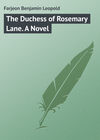Loe raamatut: «London's Heart: A Novel», lehekülg 22
CHAPTER XXIX
FELIX FINDS HIS OYSTER DIFFICULT TO OPEN
The little word uttered by Lizzie in the concluding paragraph of the previous chapter is like the dropping of the curtain for a time upon the histories of the personages, good and bad, who are playing their parts in this drama of every-day life. For if it in any way resembles what it professes to be, the drama here presented should represent the doings of the time in which it is written; in so far, of course, as they enter into the ordinary life of the ordinary characters who are introduced into it.
The autumn and winter have passed, and the beautiful buds herald the yearly miracle of spring. Certain changes have taken place in the circumstances and lives of the movers in our story, and of these changes it is necessary here to make record.
Lily has left the music-hall, and her simple songs are no longer heard in the Royal White Rose, as an antidote to the coarseness and vulgarity which find prominent place on that stage. She is missed and regretted by many of the frequenters of the Royal White Rose. Her presence there was like a fountain of pure clear water in the midst of an unhealthy tract of land; it made men and women forget for a time the impurities by which they were surrounded. I am glad to be able to say that her absence was regretted there, for it is a proof that indecency in word and action, and immoral suggestiveness in the nature of the songs sung in the Royal White Rose, are not vital elements in the success of suchlike establishments. People laugh at these atrocious songs, and at the atrocious meanings conveyed in many of the catch-lines; they suit the trade of some who are regular frequenters of these halls. But that better sentiments can be awakened in their hearts is proved by the earnest and honest enthusiasm which is evoked by the simple singing of a simple ditty, belonging to a school whose days unfortunately are not of the present. It is but a very few weeks ago that I strolled into one of the very lowest music-halls in the metropolis, in which, upon the occasion of my visit, there were not too many honest men and women, notwithstanding that the hall was quite filled. Among other indecently suggestive songs was one, the title of which I refrain from mentioning, but which has grown into a catch-phrase, and may be heard to-day uttered openly by boys and girls all over London, with laughing meaning. The title of this song is supposed to have brought much money and reputation to the Eminent Comic who invented it; if he were whipped for his ingenuity it would be a fitter reward. Whoever trades in indecency deserves some such punishment, and should receive it. After the singing of a number of similar songs, all of which were received with expressions of delight and approval, two young girls came upon the stage and sang, "What are the wild waves saying?" and an old-fashioned duet, called, I think, "The Cousins." I was amazed at the favour with which these songs were received. The applause was honest, earnest, genuine. There was nothing in music-hall ethics to account for the enthusiasm. The girls were not immodestly dressed, and did not smile or wink at the audience, and yet they were recalled again and again to sing, and their songs, which could not raise a blush or an impure thought, were undoubtedly the greatest success of the entertainment.
There were two reasons to account for Lily leaving the Royal White Rose. One reason was that her grandfather was alarmed for her health: a secret sorrow seemed to weigh upon her spirits and to depress them. She was not as happy in the society of her grandfather as she used to be, although, as if to counterbalance this and to remove any uneasiness from him, she strove to be even more affectionate to him when they were alone. The other was, that the purpose for which Old Wheels consented to her appearing upon a stage was served. The debt of shame was paid, and Felix, feeling very sorrowful the while, was compelled to accept the balance of the hundred pounds which had been saved out of Lily's earnings. The old man made no remark concerning Felix's evident reluctance to receive the money. He merely said, "Now we are free, Felix, and Lily can leave the music-hall. The little income I have will be sufficient to keep us, and I shall be able to watch more closely over my darling."
As the winter approached, Felix, going often to the little house in Soho, more often found the old man alone. Lily had a girl companion, the old man said, and Alfred and she made frequent visits to their new acquaintance.
"My dear girl seems to take pleasure in her new friend," he said, "and it is but natural, for they are nearly the same age. It is but natural also that brother and sister should cling together as Alfred and Lily do. I have seen the young lady, and there is much in her that I like."
"She has been here, then?" asked Felix.
"Yes; on two occasions. I have not been to her house; I have never been asked. Even if I were, I think I should not go."
"Why, sir?"
"Because Alfred does not wish it, and there is antagonism between my grandson and me. It has sprung up gradually, and acquires strength daily. When I first discovered it, I strove to remove it; I strove to win Alfred's confidence, but I was unsuccessful, perhaps because I did not make sufficient excuse for youth and inexperience. And he has so strong an influence over Lily that I am afraid to do anything with reference to her of which he does not approve; for he would be sure to use it as an argument against me in his confidence with my darling. God knows I do not want anything to occur to weaken her love for me! Poor girl! she must be distressed enough as it is. She is between two fires, as it were-her brother on one side, and, unhappily, her grandfather on the other. It is I who must forbear. Do you know, Felix, that I have for some time seen this conflict of feeling approaching; and a little while ago I did hope – "
"You hoped what, sir?" asked Felix, for Old Wheels had paused, as though he were approaching forbidden ground.
"That I should have had such an ally in a friend whom I esteem," said Old Wheels, looking earnestly at Felix, "as would have rendered me easy in my mind respecting my darling's future."
"This friend, sir," observed Felix, turning his head from the old man-"had you reason to suppose that he had any influence over Lily, and that his counsel would have had weight with her?"
"I believe he had influence with my dear girl; I believe he has. I believe that she would have heeded, and would heed now, any words of counsel he might speak to her."
"But suppose," continued Felix, still standing so that his companion could not see his face, "that this friend held precisely your own view of the case. Suppose he feared that any counsel he might be bold enough to offer would hurt Lily's tenderest feelings-inasmuch as it would almost of a certainty clash with her deep affection for her brother. Suppose that, seeing this, knowing this, and believing that he had some slight influence over her, he refrained from saying what was and is in his mind, because of the painful conflict of feeling which it would stir in your dear granddaughter's breast – "
He turned and held out his hand, which Old Wheels took and warmly pressed.
"What, then, remains for this friend to do," continued Felix, with animation, as they stood hand in hand, face to face, "out of regard for this dear girl's tender sensitive nature, out of regard for her helplessness? To put aside, as well as it is in his power to do, his own feelings; to be content to do as you do-to wait and hope. To do more-not only to wait and hope, but to watch over her for her good, without trusting himself before her in such a way as to cause her pain. The friend of whom you speak is doing this."
"Felix, my dear lad, how can I repay you?"
"With your friendship-but I have that, I know. Something else is on my lips, but I must not say it; something else is in my heart-you have guessed before this time what it is-but I must not give it expression. If the time should ever come-and I pray that it may-when I feel that I can speak freely, it may be in your power to repay me a thousandfold. In any case, believe that I am repaid over and over again. Now let us talk of something else."
They spoke of Felix's prospects. He had found by this time that the world he had come into London to conquer was not so easy to open as the time-honoured oyster. He had smiled often to himself since his boast to Martha, and had said, "What arrogance!" But he was mistaken. It was not arrogance. When he said to Martha Day that the world was before him for him to open, and, asking where his oyster-knife was, had tapped his forehead and said it was there, he had spoken, not out of arrogance, but out of the over-confidence of youth. He had not long been in London before he discovered his mistake. He became humbled in the contemplation of the greatness of his oyster and the littleness of himself, and he set modestly, humbly to work upon the very lowest rung of the ladder, not daring to hope to rise very high. There came to him this feeling, of which he never lost sight: "I shall be content," he said to himself, "if I can become one of the common workers in the world, and if I can find some channel in which, by the exercise of all my energy, of all the talent which I may possess, I am able to earn my living." He did not desire much; it was no boast when he said to himself that he would be content with very little; his wants were small, and he had within him the capacity to enjoy. He took his enjoyments modestly; went now and again to the pit of the theatre, and (out of his gratefulness for small blessings) obtained more than his money's worth. When he could not afford the pit he went to the gallery, and would not have been ashamed to be seen there by any of his former friends. At one time his funds were very low, so low, indeed, that he could not afford a dinner; so, apples being in, he lived upon bread-and-apples and cold water, and made merry over his fare. He told no one, and he was not in the least to be pitied; he was learning life's lessons, and was bearing reverses bravely, without repining and without self-exaltation. He tried the usual resources of helplessness; he could draw and paint indifferently well, and one day (just before his bread-and-apple fare commenced) he almost ruined himself by laying-in a stock of cardboard and crayons. In a few days he had two sketches ready, of which he thought so highly that he said, as he surveyed them, "Upon my word, I don't think I'll part with them." But he laughed at his vanity the next moment, and out he went to sell them, and came back with them under his arm. No one would buy them. He tried again the next day, and the next, and the best result that he could obtain was that a shopkeeper offered to put them in his window, and to divide the proceeds with him, supposing they were sold. Felix agreed readily enough, put a low price upon them, and went round every day to look at them in the window. He did not dare to enter the shop. "The shopkeeper might ask me for storage expenses," he said with a laugh. Then came the bread-and-apple time; and one day, longing for a change of food, he thought he would treat himself to better fare; so he painted a chop on cardboard, and with comical earnestness set out his meal-a pennyworth of apples, half a quartern loaf, a jug of water, and his painted chop. As he ate his bread he rubbed out the chop, until he had eaten every bit of it, and nothing but smudges remained. He laughed heartily over his meal, I can tell you, and so enjoyed the whimsical fancy, that it did him more good than a dozen chops would have done. He was comically concerned at the thought that he had eaten bone and all. "I wonder it didn't stick in my throat and choke me," he said; "must be more careful next time." The occasions were not few on which he made light of his reverses thus: he seasoned his bread-and-apples with many such painted dishes, and amused himself sometimes by saying that his chop or steak was underdone or burnt up. He lived rarely during these days: had pine-apples when they were out of season, pears of a guinea apiece, grapes from the hot-house, and every luxury he could think of. Then, going to the shop-window in which his sketches had been exhibited, he saw that they were gone. It gave him a shock. He had put what he considered to be a ridiculously low price upon them-ten shillings apiece. "Perhaps he sold them for more," thought Felix, and entered the shop with a jaunty air. The shopkeeper gave him good-day.
"It was best to get rid of 'em," he said; "they were blocking up the window, so I took an offer for them."
"How much?" asked Felix.
"Sketches are a drug," said the shopkeeper, fencing.
"I ought to have taken them to a chemist, then," observed Felix.
The shopkeeper stared; he had no sense of humour.
"I took seven-and-six for the pair," said the shopkeeper, and then defended himself, without being accused, by adding, "and a good price too, I consider it."
Felix looked at the shopkeeper with twinkling eyes.
"Thank you, good sir," he said; "I owe you one."
"Don't mention it," replied the shopkeeper, thinking he had got hold of a queer customer; "here's your share-three-and-ninepence."
Felix received it, and looked at the shopkeeper with an odd smile on his lips. And when he was in his room, paid the man the one he owed him by drawing caricatures of him, and suddenly developed a talent which, but for this small circumstance, might have been hidden under a bushel. With a fine sense of humour (which he was not afraid of displaying under the shopkeeper's very nose, seeing that the man did not possess the discriminative affection), Felix, the following day, took to the shop a caricature of the shopkeeper himself, in crayons, with which his patron was so tickled, not seeing the joke, that he bought it out of hand, and Felix was the richer by a crown. The joke, however, told against Felix in a certain way, for the shopkeeper would have readily given more for it; but then Felix was conscientious, and did not set too high a price upon the man. He dashed off a couple of other caricatures, and sold them likewise. The scene of one was laid at a narrow luncheon-counter which he had visited. There were three barmaids serving, but only the backs of their heads could be seen. There is no need to say that this back view was imposing. The comicality of the sketch was in the faces of the eaters, with which the narrow counter was lined. They were depicted eating their luncheons after the fashions of their various temperaments. Some were solemn, some were farcical; the face of one was buried in a pint-pot: all were grotesque. The scene of the other was a street on a rainy day. A languid swell, six feet high, was languidly holding an umbrella over his head, and a street Arab, two feet and a half high, was running by his side, crying, "Shall I 'old yer umberellar up, sir?" If Felix had been fertile in subjects, he might have done well in this line; but it was not every day that he could get a new idea, and he was above copying old ones. Then came the incident of the fire, and the acceptance of his account of it by the newspaper. He was fortunate in picking up other incidents, and made capital out of them. He grew hopeful, and began to make acquaintances. No money had ever been so sweet to him as the little money he was earning.
About this time came a rare stroke of good fortune. Mention has been made of a friend with whom he had travelled abroad, and who came home with him. Felix was in the gallery of a theatre one night, when he saw this friend in the stalls. Their eyes met, and they recognised each other. Felix made no sign, the chasm between stalls and gallery was so deep and wide. But when the piece was over Felix hurried to the door of the theatre, wondering if his friend would try to find him out. By good chance they met in the crowd; his friend had been hunting for him.
"Felix, old fellow!"
"Charley, old boy!"
"I thought I wasn't mistaken, Felix; but I was surprised to see you up there."
Felix smiled. "Funds low, old boy. Been long in London?"
"A month; can't tear myself away. Isn't it glorious? Come and have some supper."
Nothing loth, for they really had been friends, Felix took Charley's arm, and they made a capital supper, laughing and joking and quizzing as they had done in the olden times.
"But I say, old fellow," said Charley, "tell us about it. What's up?"
"I was," cried Felix merrily-he was in the gayest of humours, for the circumstance of Charley looking for him after the play to shake hands with him had gladdened his heart-"high up, eh? And only sixpence! You and I have been in queerer places, haven't we, old boy?"
And they fell-to again fishing up pleasant memories from the past. They were supping together in Charley's room at the very hotel which Felix had patronised when he first came to London.
"The waiter seems to know you, Felix," said Charley.
"I was a lodger here once, and played the part of Grand Bashaw with twopence-ha'penny in my pocket. When my twopence-ha'penny was spent, I fled."
"An honourable retreat, I'll swear," remarked Charley. Felix twirled his cigar, and puffed out royally.
"And now, old fellow, I must know all about you."
Felix told his friend all; of his quarrel with his father, softening that part of the story, and taking much blame to himself; of his quitting his home for ever and ever, never more to return, with his twopence-ha'penny in his purse; of his coming to London to conquer the world; of his failure; of his funds running out; and of his taking to the arts for a living. Only casually did he mention Lily, but his heart was so full of tenderness for her, that the few words he uttered respecting her were rightly interpreted by his friend.
"Felix, you are in love."
Felix puffed away in silence, and looked into the fire.
"Come, old fellow," continued Charley, "we used to have no secrets; we shared and shared, you remember."
"Well, Charley," replied Felix, "I have kept no secret from you. You know this one, at all events, and you know it from me. But don't let us talk about it; the odds are that it will come to nothing."
"One word only-rich?"
"Poor as I am."
"And a lady?"
"A tender-hearted, pure-souled girl. 'Right about face!'" Which, in the old days, was a favourite cry with them when a subject was to be dismissed from their conversation.
"I borrowed some money of you once, Felix."
"You did, Charley, old boy-and paid it."
"Are you sure?"
Felix laughed, rather boisterously.
"That won't do, old boy," he said; "no beating about the bush between us two. The grog's confoundedly strong." (It must have been, for it made his eyes water.)
"Look here, Charley, I want money-badly; but I must earn it. Now, if you could help me to anything in the newspaper way – "
Charley broke in here with "I can by Jove! You can do newspaper correspondence?"
Felix nodded excitedly.
"Well," continued Charley enthusiastically, "down our way we've a newspaper, of course. What's an Englishman without a newspaper? Why, they start them in the bush! Now, between you and me-it mustn't go farther, mind-my dad is part proprietor, under the rose. What a glorious thing it would be if we could get a London correspondent, who moves in the best society" – Charley winked, and Felix responded-"who is hand-and-glove with all the political nobs and the literary swells; who is behind the scenes everywhere; who knows all the news, and can serve it up piping hot and spicy! Now, then, what do you say? The Penny Whistle is only a weekly, and we could only spare two columns to our London Special."
"If you are really serious," said Felix slowly, his colour rising, for he saw a great chance in the proposal, "and the Penny Whistle can afford a special London correspondent, I could send a capital two columns every week, and I would take care to be on the look-out for anything special. Could it afford a pound a week, Charley?"
"A pound a week, old fellow!" cried Charley. "It's too little."
"It is enough," said Felix firmly; "I could not accept more under the circumstances. If the proprietors write to me to that effect, I shall only be too happy to accept."
In a fortnight from that time Felix was engaged as London correspondent at the sum fixed by himself. He ran to Old Wheels, and told the good news. He was really beginning to open his oyster.




















